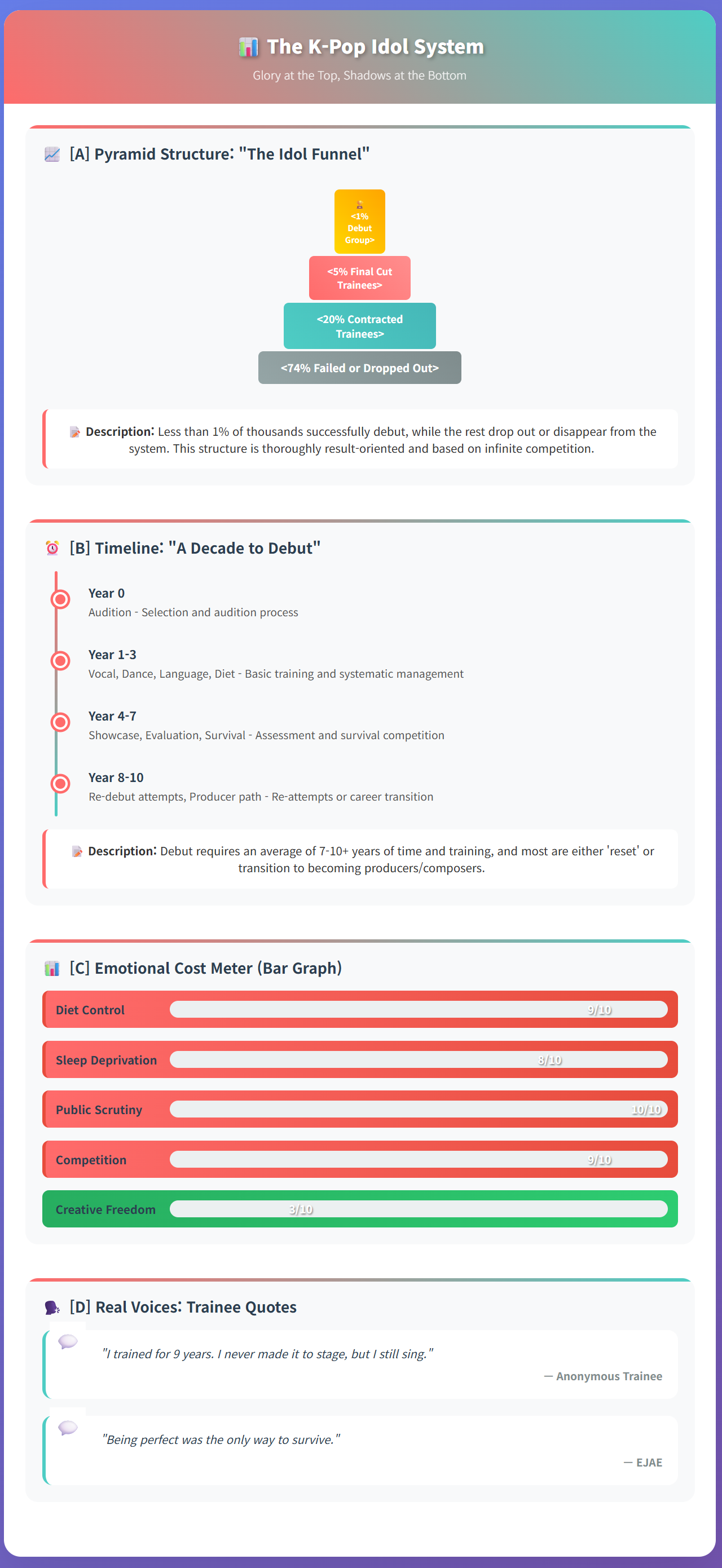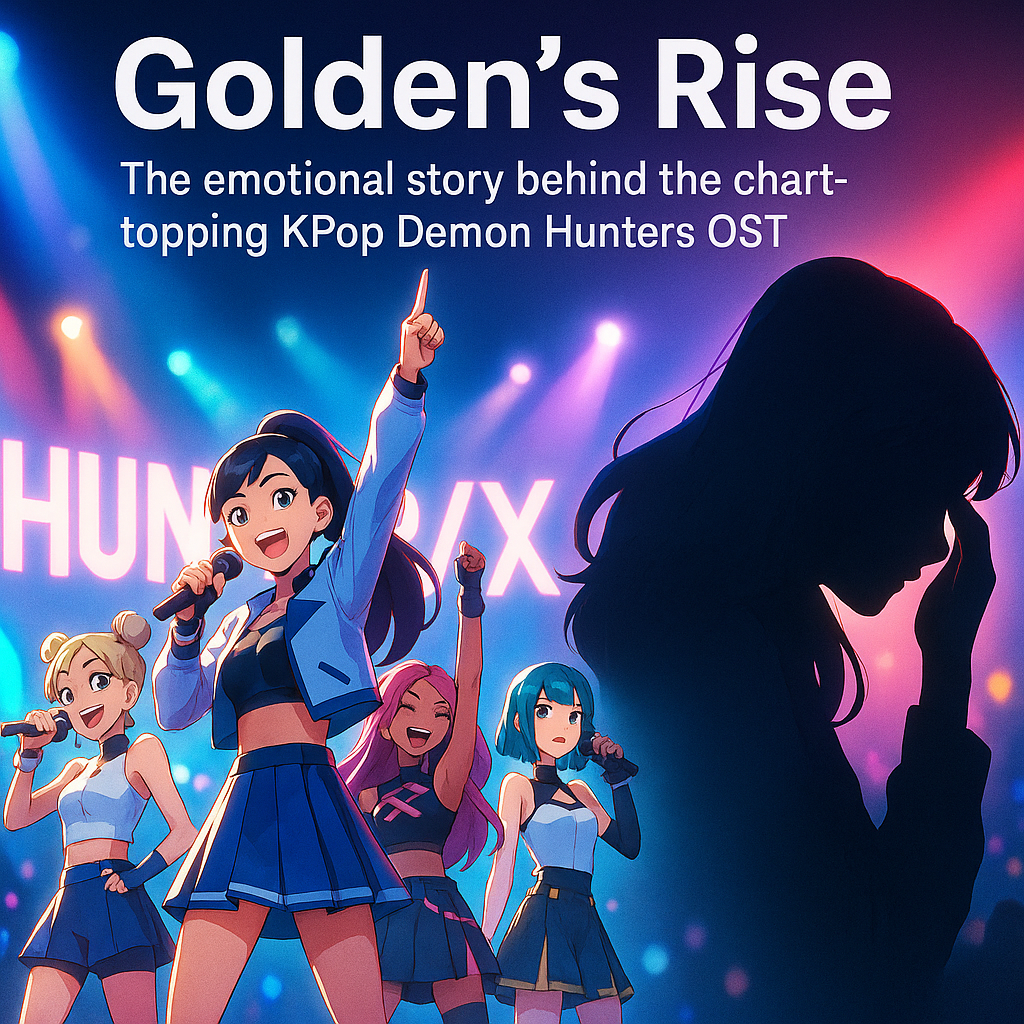The Golden Peak of K-Pop’s Glory—And the Shadows Beneath the Spotlight
"When I sang the demo, I cried a lot… it was just too real." These quiet, raw words from EJAE, the songwriter and voice behind the global sensation “Golden,” pierce through the glitter of K-Pop’s shining surface.
This week, Golden—a track from the Netflix animated phenomenon KPop Demon Hunters—is poised to top the Billboard Hot 100, a milestone never before achieved by a K-Pop girl group. Already crowned #1 on the UK Official Singles Chart and holding strong at #2 on the Hot 100 for two consecutive weeks, “Golden” is now trailing the top spot by just two points—a photo finish in the making.
If projections hold, it won’t just be a personal victory for the artists behind the track—it will mark an unprecedented moment in global music history: the first time a K-Pop girl group dominates both sides of the Atlantic simultaneously. Even more astonishing, the film’s rival fictional boy group, SajaBoyz, has also broken into the Billboard Hot 100 Top 10 with Your Idol, making it the first time two virtual K-Pop groups have landed on the chart together. The movie’s full OST also debuted at #2 on the Billboard 200—2025’s best soundtrack debut so far. According to Rolling Stone, the film’s virtual girl group HUNTR/X has even surpassed the Spotify records set by BTS and BLACKPINK.
This is not coincidence. This is not luck. This is K-Pop's system—precise, relentless, dazzling—at full throttle.
---
Behind the Glory of “Golden”: EJAE’s Journey Through the Fire
At the beating heart of this shimmering success is EJAE (Kim Eun-jae)—the voice, pen, and soul behind Golden. Born in Seoul in 1991, she entered SM Entertainment as a trainee at age 11, stepping into a world that demanded perfection from the moment she arrived. For over a decade, she underwent some of the most intense training in the music industry, eventually becoming a vocal director for other idols and composing hits for major acts like TWICE, aespa, Red Velvet, LE SSERAFIM, and Suzy.
Yet, despite her talent, devotion, and time served, EJAE never debuted as an idol.
Instead, she watched from behind the scenes as others took the spotlight she once chased. She revealed she deeply connected with the film's protagonist, Rumi, a perfectionist haunted by self-doubt. “There’s something painfully familiar about hiding your shame and pushing yourself to be the best,” she admitted. Her story echoes that of countless trainees—undeniably gifted, heartbreakingly close, but ultimately left outside the debut door.
When asked how she felt while recording Golden, EJAE didn’t hesitate: “I was going through a very difficult time. I cried a lot while singing the demo. The lyrics just hit too close to home.”
Her voice—both literal and emotional—infused the track with a resonance that’s hard to manufacture. It’s why listeners around the world are moved. “Everyone’s going through something. We all want to feel a little bit of hope,” she added. “Maybe that’s why Golden keeps rising.”
But her honest reflection leaves a painful question lingering in the air: How perfect must one be to survive the system of K-Pop? How much more must a young person give, before they're finally deemed 'good enough'?
EJAE may now stand at the pinnacle of global recognition, but it is a summit built on years of silence, sacrifice, and sorrow. She confessed that songwriting became her only form of healing, the only way to make her pain mean something. And she never gave up.
---
Writing Pain into Power: The Transition from K-Pop to Cinema
EJAE’s transition into film scoring was not seamless—it was transformational. While K-Pop songwriting focuses on crafting high-concept, identity-driven hits for fandoms, movie tracks demand emotional storytelling that binds characters, plots, and arcs into sound.
She experimented vocally too, venturing into the A5 falsetto register—a vocal range she hadn’t previously explored. “Through this film, I found a new side of my voice,” she said. “It made me grow as both a composer and a singer.”
Now, Golden is set to be submitted for Best Original Song at the 98th Academy Awards, potentially making it the first Korean pop song from an animated film to compete on such a stage. For EJAE, even being considered is surreal. “It feels like I’m finally living the dream I thought I lost,” she said.
And the world is noticing. Both Korean and American studios are racing to offer her new opportunities, while she stays grounded, intent on becoming even better. Even now, EJAE’s heart beats with quiet resilience.
---
The System That Polishes—and Sometimes Breaks—Diamonds
K-Pop is a dream machine. But dreams cost.
Over the past decade, the industry has grown into a global behemoth, pulling in billions in revenue and creating fandoms larger than most countries. But beneath the marketing magic lies a system that manufactures youth into idols, demanding flawlessness from bodies, voices, and personalities.
As columnist Jeff Benjamin aptly notes, the very word “idol” implies divinity, an impossible perfection. For teens and young adults, the weight is crushing.
To become an idol, one must survive cutthroat auditions, years of isolation in trainee camps, rigorous diets, restricted communication with the outside world, and the mental toll of constant judgment. Even after debut, the pressure doesn't ease—it escalates. Public scrutiny, fan demands, and unrelenting expectations to “stay relevant” form a vicious cycle.
Former Girls’ Generation member Jessica Jung once said in an interview that rules like no dating, no phones, and perpetual dieting remain industry norms. These constraints don’t nurture—they control.
KPop Demon Hunters does more than glamorize this world—it critiques it. The film tells the story of idols fighting literal demons, but beneath the fantasy lies a biting allegory: What demons do real idols fight every day?
The answer is chilling—anxiety, burnout, self-doubt, and the relentless pursuit of unattainable perfection. The industry polishes its stars until they shine blindingly bright… or shatter.
---
The Factory of Perfection and the Ones Left Behind
EJAE’s journey asks us to look again at the K-Pop machine—not with awe, but with inquiry. How many other EJAEs are there, training in silence, then quietly disappearing?
She trained for over a decade, had multiple debut plans canceled, and still held on. Others don’t.
This system isn’t just about spotlighting talent—it’s about filtering for flawless. The top 1% of the top 1% survive. The rest are cast aside—not for lack of passion or potential, but for failing to fit the mold. It is, in many ways, less an audition and more a cultural mining operation—sifting through thousands to find that one dazzling gem.
---
K-Pop’s Inevitable Reign—and the Cost of Its Crown
The global dominance of K-Pop is not a fluke. It is engineered success, born of decades-long systems designed to produce excellence. But it also rests on the backs of young people who gave everything—and often got nothing in return.
And yet, ironically, this is also why K-Pop continues to thrive. Its stories are real. Its pain is authentic. Its stars, even when fictional, are built on real blood, sweat, and tears.
The success of KPop Demon Hunters reflects this paradox perfectly. According to Google Trends, July 2025 saw record-breaking global searches for Korean cosmetics, skincare, and travel, with K-Pop acting as the silent engine behind it all. The ripple effect is undeniable—economic, cultural, emotional.
Those who say “K-Pop doesn’t benefit Korea” ignore the data—and the hearts it changes.
Golden’s rise to #1 is not just a chart story. It is a human story, stitched together by voices like EJAE’s—voices that once sang in the dark, and now ring across the world.
As we celebrate K-Pop’s golden age, let’s remember: its brilliance is made not just of melody and dance, but of sacrifice, longing, and truth. And for artists like EJAE, this moment isn’t the end. It’s the long-overdue beginning.

